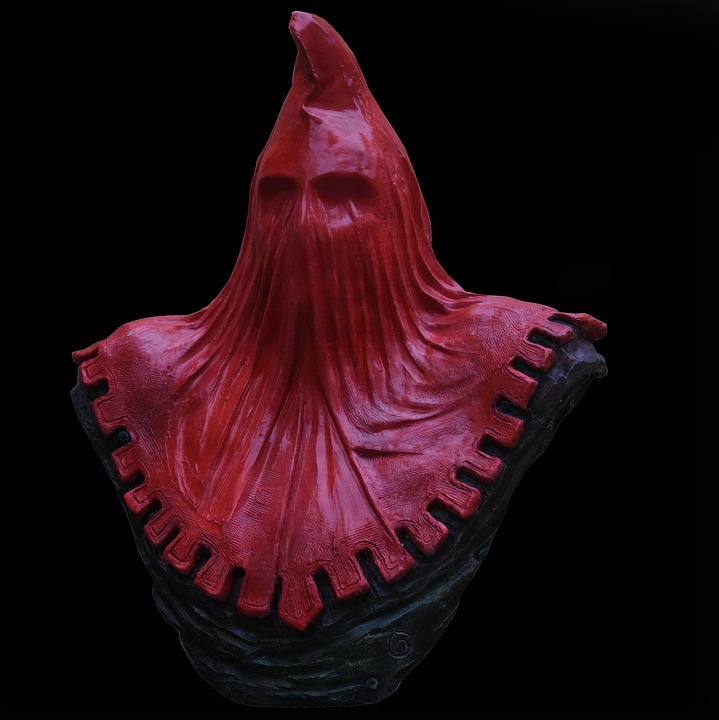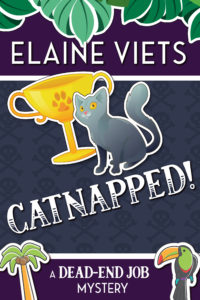By Elaine Viets
Today’s entry by an anonymous Brave Author has the intriguing title “Dearest Executioner.” Read this first chapter, and then I’ll give my critique. I look forward to your comments, readers.
Dearest Executioner
Mara sat atop the splintered bench between the oarsman and executioner, hysterical laughter bubbling in her throat. Her hands were bound behind her back, heavy rusted shackles rubbing her wrists raw. The moon hung low. Lights of the distant manor dwindling into darkness. Would the souls wandering those warm halls shudder at the echoes of screams? Or close the shutters, certain they heard nothing more than howling winds? As it was, no breeze rustled her hair.
Mist sat stagnant over the fetid bog. Insects hidden in the reeds chattered their solemn eulogy. The oarsman guided the decaying ferry through the thick muck with practiced rhythm. His rows slow, steady. As though allowing his passengers time for morbid reflection of their sins. Ought she contemplate her own? Perhaps no. No journey would be long enough. The urge to laugh intensified.
Her gaze flicked to the other man aboard. Shrouded in a fine black tunic and gloves, hood hiding his face. A grin split her chapped lips.
“Did someone tell you executioners wear black, or had you read it in a silly book?”
His shadowed visage angled away from her.
“Yes, surely the marsh is more fascinating than your soon-to-be victim.” She leaned closer to him, the wood creaking beneath her. “Don’t you wish to hear my crimes, dearest executioner?”
“Your crimes are against Lord and Lady Loch. That is all I need know.”
She nodded her head several times. “A sensitive family. Easy to offend. And quick to punish. Murder seems rather disproportional a sentence for honest speaking, but who am I to decide what’s fair?” She tipped her head. “How have you offended them?”
His attention snapped to her. Voice cruel. “I’ve done nothing.”
“Oh, but you have, you have. Perhaps murdering me is how you atone? A dark gesture of loyalty and all is forgiven? I think, no. Evil things haunt this marsh. Hungry things. Oh, dearest executioner, you’re as dead as I.”
He stared at her a long moment. “You’re mad.”
“Perhaps a giddy spirit has taken claim of my wits. They’re about in this unholy marsh, don’t you know? Others, too. Others dead, but not.”
“There are no unnatural beings here,” he said. “Only we three.”
The little bubbles rose, coming out as tremulous giggles. “You’re a sure man. A sure, sure man. A man who will not survive this night.”
 ______________________________________________________________________
______________________________________________________________________
Elaine’s Critique
You’ve done a fine job of setting the mood here, Brave Author. This is an impressive piece of writing. While you’ve painted an eerie scene, it doesn’t go anywhere. A first chapter is supposed to deliver three things: Time, Place and Point of View.
Your POV is quickly established: This is third-person omniscient, a good choice for storytellers. First-person would be too limiting.
But this first chapter is floating in time and space. What century are we in?
What season is it? I’m guessing, from the sounds of the insects, that it’s either summer or fall, but let us know.
Where are we? What country? I’m guessing it’s either Scotland or Ireland, but tell us.
Mara is a little too mysterious. What has she done that’s condemned her to this lonely death? Did she commit treason? Is she a witch? What she part of a plot?
Please tell us.
Who and what are Lord and Lady Loch? Are they powerful land owners? Rulers of the county? We need to know this.
These issues can be quickly fixed. Most of this information could be added in the third sentence. Something like:
“The witch (or traitor or rebel) watched the moon hang low over the Scottish highlands . . . .”.
There’s fine writing here, Brave Author.
The title immediately captures my interest.
I’m impressed that you didn’t need to tell us that Mara was in a boat. Instead you said:
“Mara sat atop the splintered bench between the oarsman and executioner, hysterical laughter bubbling in her throat.”
That not only says where she is and that she’s on her way to her death, it establishes her own mood.
I admire the death images in the second paragraph:
“Mist sat stagnant over the fetid bog. Insects hidden in the reeds chattered their solemn eulogy. The oarsman guided the decaying ferry through the thick muck with practiced rhythm. His rows slow, steady. As though allowing his passengers time for morbid reflection of their sins. Ought she contemplate her own? Perhaps no. No journey would be long enough. The urge to laugh intensified.”
One small quibble. It should be reflection “on” their sins, not “of.”
There’s foreshadowing, too, as Mara warns the executioner: “You’re a sure man. A sure, sure man. A man who will not survive this night.”
Good job, Brave Author. A few small changes and you’ll have a first-rate story. I can’t wait to read it. What about you, TKZers?
_________________________________________________________________
Win the new e-book version of Catnapped!, my 13th Dead-End Job mystery, set in the strange world of show cats. Click Contests at www.elaineviets.com




Setting and mood evocative and multi-sensory, effective dialog, conflict, high stakes…
I agree with Elaine – impressive.
An excellent opening!!
I really want to know the rest of the story, Tom. Glad you agree.
I also agree. Extremely captivating and setting the mood well. I like the title too. And if I see a book with that title and that opening sentence, I will read further, even if I rarely read books in this genre.
That’s how I feel, Victoria. This author uses all five senses.
As with Victoria and Tom, WELL DONE! I would turn the page in a second to learn more about this boat ride. Take Elaine’s comments to heart. A few small tweaks and this is the great start to a story.
The only thing I would add is “Would the souls wandering those warm halls shudder at the echoes of screams? Or close the shutters, certain they heard nothing more than howling winds?” Needs to be added to the tweaks. As it stands it is out of place. Perhaps this would be when to introduce Lord and Lady Loch? If it is their manor, this would clean up introducing them and the one sentence I saw as needing a fix. I probably would have gone with people not souls. But it is a quibble.
I would be turning the page to see what happens next. Well Done.
Completely agree with you suggestion, Alan. Thanks for stopping by.
Excellent piece. Like Victoria, this isn’t my genre but I would keep reading b/c the writing is so good.
The same sentence that bothered Alan also tripped me. “Souls wandering” initially sounded like ghosts but “warm halls” didn’t fit with ghosts so I had to reread. Perhaps something like “the gentry feasted and danced in the warm halls.”
The detail about closing shutters and pretending not to hear screams was perfect.
Let us know when this is published, dearest author!
Another good suggestion, Debbie, and you gave out author a good solution.
I liked this. I like the tone and the somewhat archaic words and syntax because it suits the subject matter. I like the defiance of the woman; she’s brave even as she’s terrified. There’s enough suspense, for me at least, in the simple fact that a shackled woman is being rowed to her death. I don’t need to know right now exactly where in the world this takes place, because the “Lord and lady Loch” reference implies Scotland. (There was, in fact, a real Lord Loch up that way.). I would read on.
Only suggestion: Watch out for overusing sentence fragments. My opinion here, but I think they work best in action-scene moments, when thoughts and emotions are jumpy and fast-flying. The woman is clearly in distress, but her thoughts and words seem oddly self-possessed. Which is interesting in itself.
I betcha her executioner turns out to be a love interest. 🙂
Another good point, Kris.
By the second paragraph, I forgot I was at TKZ, and I thought I was reading a new story I had picked up. It drew me in quickly.
I wondered not so much where we were, but how far back we were. 18th Century? 19th? I assumed Mara’s words are so doggone proper because of the time and her position in society. Her nervous giggles, her chapped lips, and her throaty bubbles said enough to let me know her state of mind.
I enjoyed this, and I admired the same things Elaine pointed out. It sounds like a Gothic horror story in the making, which I love. Thanks, Brave Author, for sharing your opening, and good luck in your continued writing journey.
Definitely need a century, Priscilla. I can’t wait to read the rest of this story.
Thanks for sharing your work with us, brave writer, and thanks to Elaine for her kind support of our brave writer. Love the illustrations, Elaine.
I don’t have a lot of time to comment today; however, I feel the need to jump in and caution that the formal language and POV of this submission create distance. Perhaps this is the author’s intent, but this style is not popular with editors today. See the interview with literary agent Paula Munier (http://www.jungleredwriters.com/2014/11/literary-agent-paula-munier-on-plot.html). Also see the article “Point of View—Part Three” by fiction editor Beth Hill (available at Beth’s blog online). Consider tightening the dialogue.
Best of luck and keep writing!
Not sure I agree with you, Joanne. I don’t see where the POV creates distance, and we have to know the time period. In most pre-20th century periods, the language is far more formal than it is today.
I am assuming this submission is some kind of fantasy. Here’s what Paula Munier says in an interview with Hallie Ephron:
HALLIE: I get into arguments (who me?) with writers who insist that they can write a book from an omniscient viewpoint. Do you think these days that flies?
PAULA: Omniscient POV is considered very old-fashioned these days. It’s a red flag for editors; they assume that you don’t know your craft well if you are using omniscient POV. It can mark you as an amateur. I won’t even try to sell a project written in omniscient POV—even in SF/fantasy, which is the only place you really ever see it these days.
http://www.jungleredwriters.com/2014/11/literary-agent-paula-munier-on-plot.html
Based on this advice, I would advise our brave writer to tell the story from Mara’s POV. I’d avoid sentences like these:
“Would the souls wandering those warm halls shudder at the echoes of screams? Or close the shutters, certain they heard nothing more than howling winds?”
They sound more like author intrusion. Anyway, I just want our brave writer to have the best chance of success with her submission. I don’t mean to be a wet blanket. My opinion and fifty cents might buy a cup of coffee!
Fashions in publishing change so quickly that by the time you catch that wave, there’s another trend. For a while all mysteries seemed to have “Girl” in the title (some still do). We’re currently awash in unreliable narrators. First person has so many limitations, I’m in favor of telling the story the way the narrator feels comfortable. That said, my new mystery, “Ice Blonde,” is fashionably first person.
You are so right about trends, Elaine. I just read an article in the NYT called “The Return of Omniscience” by Elliot Holt (https://www.nytimes.com/2016/09/11/books/review/the-return-of-omniscience.html). One example given was the literary novel Everything I Never Told You by Celeste Ng. It begins: “Lydia is dead. But they don’t know this yet.” So our brave writer should follow her own heart, and I hope she’ll let us know what happens. Writing is an adventure!
I will have to check out Ice Blonde. I love the cover!
I’m a sucker for lyrical prose, and this first page delivered. I’m curious, but I think that’s a good thing. Maybe the author intends to mete out information in small, digestible chunks until we have a real understanding of the stakes.
We know she’s marked for death, but why? And by whom?
Lovely word choice, excellent grammar and punctuation, and solid authorial voice. My only quarrel is one Elaine pointed out. I couldn’t really find my footing because I didn’t know the time period.
Thanks for the dead-on critique, Elaine. Brave author, let us know how it goes!
I loved this! I assumed from the context that the accused was a witch and she was either cursing or predicting his death. I also thought the souls meant ghosts so people or the living might work better. I love any mystery, thriller, suspense, horror, and gothic genres. I would like to read this when it’s published or about to be.
Me, too, Rebecca. Brave Author, we all wish you luck and want to know what happens to your novel. Please let us know.
I was intrigued, and would continue to read this story even though I don’t usually read this genre. The author has talent and the critique should be very helpful.
Good luck and best wishes with your story.
Well said, Frances.
Thank you all for your well thought out, kind and encouraging feedback to my first page. A special big thanks to Elaine for your time and effort to critique my work.
I wonder if a simple word swap from lord to laird would clear up where we are?
As for when, I’m not a fan of clunky dialogue, “Don’t you know it’s the 18th century, old boy!” So maybe a subtle mention of prejudice against a British monarch or hint of concealed tartan which were banned in the mid 1700’s?
I’m not sure yet, but I think everyone is correct in thinking “souls” should be changed to people, gentry, or the like.
Thank you all again so much. The feedback from TKZ is truly priceless!
Thanks for stopping by, Brave Author, and I’m glad the folks at TKZ could be of help. I think you’ll need more that changing lord to laird to indicate the time. And you’re far too clever to use clunky dialogue, “Don’t you know it’s the 18th century, old boy!”
Good luck!